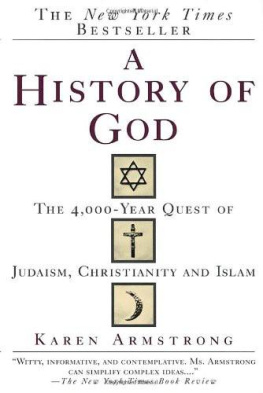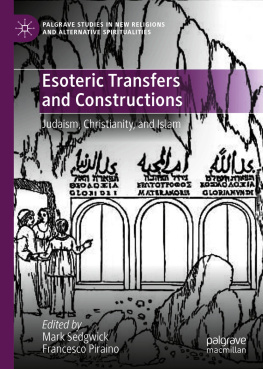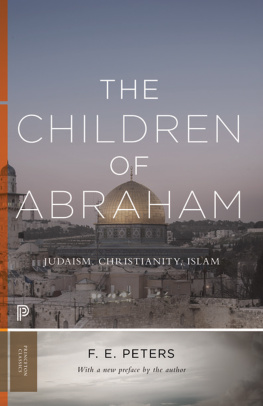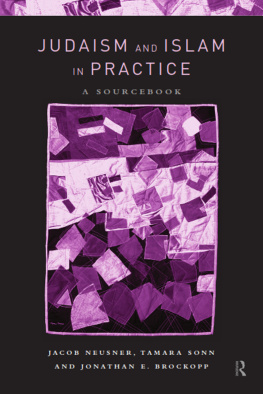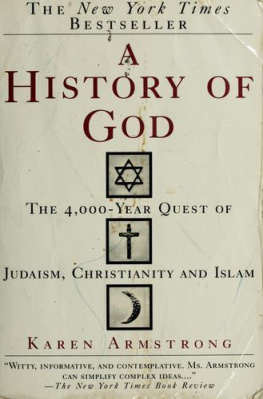Peters F. E. - The children of Abraham: Judaism, Christianity, Islam
Here you can read online Peters F. E. - The children of Abraham: Judaism, Christianity, Islam full text of the book (entire story) in english for free. Download pdf and epub, get meaning, cover and reviews about this ebook. year: 2004, publisher: Princeton University Press, genre: Religion. Description of the work, (preface) as well as reviews are available. Best literature library LitArk.com created for fans of good reading and offers a wide selection of genres:
Romance novel
Science fiction
Adventure
Detective
Science
History
Home and family
Prose
Art
Politics
Computer
Non-fiction
Religion
Business
Children
Humor
Choose a favorite category and find really read worthwhile books. Enjoy immersion in the world of imagination, feel the emotions of the characters or learn something new for yourself, make an fascinating discovery.

- Book:The children of Abraham: Judaism, Christianity, Islam
- Author:
- Publisher:Princeton University Press
- Genre:
- Year:2004
- Rating:4 / 5
- Favourites:Add to favourites
- Your mark:
- 80
- 1
- 2
- 3
- 4
- 5
The children of Abraham: Judaism, Christianity, Islam: summary, description and annotation
We offer to read an annotation, description, summary or preface (depends on what the author of the book "The children of Abraham: Judaism, Christianity, Islam" wrote himself). If you haven't found the necessary information about the book — write in the comments, we will try to find it.
Peters F. E.: author's other books
Who wrote The children of Abraham: Judaism, Christianity, Islam? Find out the surname, the name of the author of the book and a list of all author's works by series.
The children of Abraham: Judaism, Christianity, Islam — read online for free the complete book (whole text) full work
Below is the text of the book, divided by pages. System saving the place of the last page read, allows you to conveniently read the book "The children of Abraham: Judaism, Christianity, Islam" online for free, without having to search again every time where you left off. Put a bookmark, and you can go to the page where you finished reading at any time.
Font size:
Interval:
Bookmark:
The Children
of Abraham
of Abraham
Judaism, Christianity, Islam
A NEW EDITION
F. E. Peters
with a Foreword by John L. Esposito

Copyright 2004 by Princeton University Press
Published by Princeton University Press,
41 William Street, Princeton, New Jersey 08540
In the United Kingdom: Princeton University Press, 3 Market Place,
Woodstock, Oxfordshire OX20 1SY
All Rights Reserved
Library of Congress Cataloging-in-Publication Data
Peters, F. E. (Francis E.)
The children of Abraham: Judaism, Christianity, Islam
F. E. Peters.New ed.
p. cm.
Includes index.
ISBN 0-691-12041-2 (cl: alk. paper)
1. JudaismHistoryTo 1500. 2. Christianity.
3. IslamHistoryTo 1500. I. Title.
BM157.P47 2004
201'.4dc22 2004040049
This book has been composed in Janson
Printed on acid-free paper.
pup.princeton.edu
Printed in the United States of America
1 3 5 7 9 10 8 6 4 2
For
Edward Peter Fitzsimmons
Publication of the thoroughly revised and substantially rewritten edition of Frank Peterss Children of Abraham is important for two essential reasons. First, it signals the enduring significance of this groundbreaking volume. Second, I can think of no time when it has been more needed. In addition to the inherent significance of Jewish, Christian, and Islamic religious faiths, the realities of globalization and international politics in the twenty-first century make understanding of these three great faiths and the dialogue among them imperative.
The initial publication of Children of Abraham occurred in a world that acknowledged the interconnectedness of Judaism and Christianity by coining the term Judeo-Christian. This reflected the realities of postWorld War II geopolitics and theology. However accurate and well meaning, this approach tended to perpetuate the failure to recognize all the Children of Abraham. Islam is also a great monotheistic tradition with origins in the Middle East and a long historical and theological connection to Judaism and Christianity. Yet Islam was grouped and studied with Eastern religionsHinduism, Buddhism, Taoism, and Confucianism. Peterss book was part of a movement among some scholars to correct this oversight or distortion and thus alert students and scholars, religious leaders, and the general public to the fact that there is a Judeo-Christian-Islamic tradition.
The world and international politics have changed dramatically in the years since the publication of Children of Abraham. While Muslims were relatively invisible in the cognitive and demographic maps of the West only a few decades ago, today the landscapes of most cities and towns include mosques and Islamic centers alongside churches and synagogues. Islam has emerged as the third largest religion after Christianity and Judaismin some places second only to Christianity. Indeed in some areas Islamic centers and mosques now occupy former churches. Muslims live and labor in our cities, towns, villages, andregrettablyghettos; they are professionals and laborers, and they are among the unemployed. Thus today, consideration of Islam and the West must be accompanied by an understanding of Islam in the West or the Muslims of the West. The major Muslim communities and cities of the world of Islam include not only Cairo, Damascus, Islamabad, Kuala Lumpur, and Khartoum but also London, Bradford, Paris, Marseilles, New York, Detroit, and Los Angeles.
One of the great ironies of the past and present is that despite our apparent development and sophistication, too often we are bound by our cognitive as well as spatial ghettos. As evidenced by the examples of Northern Ireland, India, Palestine-Israel, and elsewhere the fact that faiths coexist in the same country or area does not mean that they come to know and respect one another. Only a few decades ago, neighborhoods in many American cities were identified by the ethnic or religious group that lived thereItalian, Polish, Irish, WASP, or Jewish. Desire to preserve a religious or ethnic identity within the American melting pot had important positive aspects but also too often reinforced a cultural or religious isolation. People lived near each other, even worked side by side, but often knew little about the cultural or religious heritage of others. How many Christians or Jews really understood the faith of their fellow citizens? For that matter, how many Methodists understood Catholics, and vice versa?
Like ethnic Christians and Jews as well as other religious minorities, Muslims in recent years have faced issues of faith and identity, the choice of assimilation or integration. At the same time, their experiences have differed as a minority seeking to define itself within and over and against majority secular or Judeo-Christian societies of Europe and America. If some (Muslims and non-Muslims alike) have questioned whether Islam is compatible with the pluralism and values of Western culture, non-Muslims have themselves experienced the testing of the boundaries of their notions of liberalism and pluralism. They have been confronted by concerns ranging from equal acknowledgment of Islam in society and the workplace to specific issues like recognition of Muslim holy days, the right to wear a beard or a headscarf (hijab) on the job, and the claims of mainstream Muslims to have their pursuits distinguished from the acts of religious extremists.
Family in the history of religions, as in the ordinary lives of many, is a source of strength, nurturing, love, and security but also of conflict and violence. Biblical and Quranic stories such as those of Cain and Abel, Isaac and Ismail underscore this truth. Despitesome would even argue because ofclose family resemblances, relations between Judaism and Christianity, Christianity and Islam, Judaism and Islam have often been characterized by tension, conflicts and persecution. The beliefs of each that it possesses the one true Gods revelation and special covenant and, in the cases of Christianity and Islam, that it supersedes earlier revelations, have been stumbling blocks to religious pluralism and tolerance.
Religious pluralism and tolerance came late to Christianity. Christendom had no space for Jews, Muslims, and indeed other Christians who were regarded as schismatics or heretics. Islam did provide a space for Jews and Christians, recognizing them as People of the Book, those who had received Gods prophets and revelation. As protected (dhimmi) people, they could practice their faith in exchange for payment of a poll tax. Though second class citizenship by modern standards, this ideal (though not always observed) was progressive for its times. The coexistence of faiths can be seen in the early dynamic development of the Islamic world as a civilization that flourished and eclipsed Western Christendom in its Dark Ages. Muslim accomplishments were the product not simply of conquest but of a voracious quest for knowledge and development that relied heavily on other cultures. Under the cosmopolitan Abbasid dynasty (7501258) seated in Baghdad, relations between Christendom and the Islamic world were marked not only by conflicts of imperial expansion but also by substantial interchange: diplomatic, intellectual, artistic, and commercial. Christian and Muslim businessmen engaged in brisk and prosperous trade. Rulers like Charlemagne and Harun al-Rashid were in diplomatic contact; Muslim rulers employed Christian clergy who knew Latin on missions to Christian rulers. Christians, who served as administrators and bureaucrats, as artisans and craftsmen and as translators, played a major role in the development of Arab/Islamic society, science, and civilization.
Next pageFont size:
Interval:
Bookmark:
Similar books «The children of Abraham: Judaism, Christianity, Islam»
Look at similar books to The children of Abraham: Judaism, Christianity, Islam. We have selected literature similar in name and meaning in the hope of providing readers with more options to find new, interesting, not yet read works.
Discussion, reviews of the book The children of Abraham: Judaism, Christianity, Islam and just readers' own opinions. Leave your comments, write what you think about the work, its meaning or the main characters. Specify what exactly you liked and what you didn't like, and why you think so.


